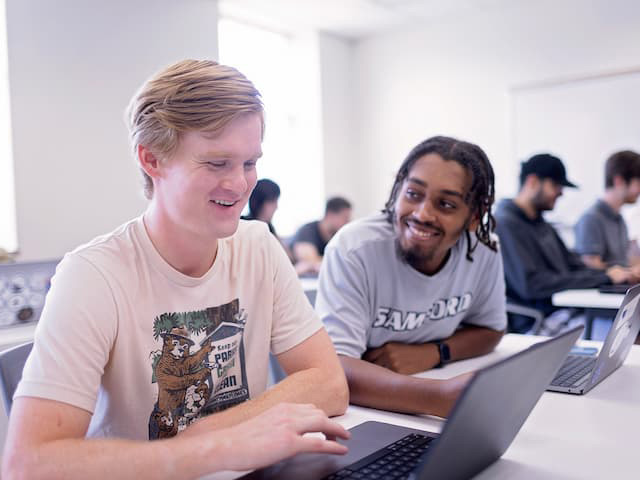
Cybersecurity is one of the fastest-growing industries in the United States. The Bureau of Labor Statistics estimates a “32% growth in cybersecurity employees between 2022 and 2032, much faster than the average for all occupations.” To ensure Samford students are prepared to enter this growing workforce, Samford University now offers cybersecurity classes through the Department of Mathematics and Computer Science.
"Because we rely on technology, there is an ever-growing need to keep information safe as it moves between people and organizations,” Mathematics and Computer Science Instructor Scott Crews said. "Cybersecurity is focused on protecting that information. Companies need teams of highly trained professionals who can protect critical assets while enabling the business to move quickly. The job outlook in this field is strong and the work is important."
Crews is teaching four courses:
- COSC 240 - Introduction to Cybersecurity
- COSC 340 - Cybersecurity Governance, Risk, and Compliance
- COSC 440 - Cybersecurity Engineering
- COSC 445 - Cybersecurity Operations
"Cybersecurity, like any discipline, has a unique set of terms and concepts that define the industry,” Crews said. "We cover these in the classroom but getting "hands-on" training is important too. Our classes are designed to give students an opportunity to apply each concept as we learn, which means we create viruses, learn how to use phishing tools and take control of computers remotely. Of course, we do this in a lab designed to learn hacking safely."
Prior to Samford offering these classes, students gained cybersecurity skills through their software development courses. However, this education did not encompass all the necessary skills for a successful career in this field.
"There are some specific cybersecurity concepts and skills that students might not otherwise encounter in a traditional computer science education," Crews said. "These courses give our students an opportunity to learn concepts and gain experience with tools that will help them pursue a career in cybersecurity."
Crews' background in information security is why he was hired to teach these courses. After graduating from Samford in 2005, Crews worked in public accounting and information security consulting for LBMC, an accounting firm in Nashville, Tennessee. Then, he moved to Charlotte, North Carolina, to work in the Information Security department for Lowe's Home Improvement.
"I have been blessed to work with some incredible people through the years—the only thing we need is more of them," Crews said. Last year I left the corporate world and came to Samford because I believe that Samford students pursuing careers in cybersecurity is a win-win for all parties.”
Mathematics and Computer Science Chair Chad Awtrey said, "I look forward to seeing the positive impact Scott will have through the cybersecurity courses and the subsequent network connections he will foster between our students and professionals currently working in the cybersecurity sector."
